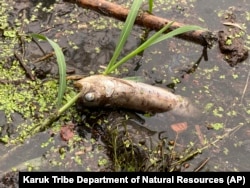Native American News Roundup August 7-13, 2022

[ad_1]
Here is a summary of Native American-related news around the U.S. this week:
New Federal Group to Challenge Racist Place Names
Interior Secretary Deb Haaland has named an Advisory Committee on Reconciliation in Place Names to consult with tribes, tribal groups, state and local governments and the public to identify and recommend changes to derogatory geographic names.
Oglala Lakota tribal archaeologist Michael Catches Enemy, Niniaukapealiʻi Kawaihae of the Department of Hawaiian Home Lands and Kiana Carlson, an Ahtna Kohtaene and Taltsiine law student from the Native Village of Cantwell, are among the group established in Secretary’s Order 3405, issued in November 2021.
“Our nation’s lands and waters should be places to celebrate the outdoors and our shared cultural heritage – not to perpetuate the legacies of oppression,” Haaland said in a statement Tuesday. “The Advisory Committee on Reconciliation in Place Names will accelerate an important process to reconcile derogatory place names. I look forward to listening and learning from this esteemed group.”
To see a full list of members, click link (below).
California Wildfire, Rain, Led to Death of Thousands of Klamath River Salmon
The Karuk Tribe is blaming a 90-square-mile wildfire in northern California for the deaths of tens of thousands of fish along the Klamath River near Happy Camp, California. They believe that heavy rainfall set off a massive mudslide from the area scorched by the McKinney wildfire, which has decimated more than 233 square kilometers since July 29. The mass of debris flowed into the Klamath River, bringing water oxygen levels to zero, which caused fish to suffocate.
For years, the Karuk and Yurok tribes of northern California have fought to protect salmon, which were once abundant in most of the state’s major rivers and streams and were central to Klamath tribes’ sustenance, spirituality, and economies. But damming, water diversion and climate change have caused a drastic decline in salmon populations.
The Karuk Tribe says it’s still too early to know whether the fish kill will impact the fall migration of Chinook salmon or areas of the river downstream.
Poll: Native Americans Hit Hard by Inflation, Pandemic
A new poll shows that the COVID-19 pandemic, inflation, and political and social divides of the past two years have had a disproportionate impact on Native Americans and other minority groups in the U.S.
The poll says 63% of Native Americans today face serious financial problems, compared to Black Americans (55%), Latino Americans (48%) and white Americans (38%).
The survey was a joint project of the Robert Wood Johnson Foundation and Harvard University’s T.H. Chan School of Public Health along with National Public Radio. It polled nearly 4,200 U.S. adults between May 16 – June 13.
“Millions of minority households across the nation are facing distinct, serious financial problems during this period, including many who are being threatened with eviction and face unsafe conditions in their neighborhoods, with few options to help,” said study co-director Robert J. Blendon, a professor of public health at Harvard’s Chan School.
Thirty-nine percent of Native Americans, 32% of Black Americans, 30% of Latino Americans and 13% of Asian American adults are having trouble getting food on the table, compared to 21% of white Americans.
Oregon university to offer tuition discounts to students from all federally recognized tribes
Beginning this fall, Portland State University (PSU) in Oregon will allow students from all federally recognized tribes in the U.S. to receive in-state tuition benefits. Non-resident undergraduate students normally pay $620 per credit hour. Native American student tuition will be reduced to the resident rate of $200 per credit hour.
Typically, students take 12 to 15 credits per semester. This means Native American undergraduate students will save up to $19,000 per semester.
The Postsecondary National Policy Institute in 2021 estimated that fewer than a quarter of 18-24-year-old Native Americans were enrolled in college, compared to 41% of the overall U.S. population.
PSU says it is the only U.S. school to offer tuition discounts to Native American students on a national scale. Earlier this year, the University of California system announced it would waive tuition and fees beginning in fall 2022 for all Native American students who are state residents and members of federally recognized California tribes.
Native Americans Give ‘Prey’ High Scores for Authenticity
Native American viewers and critics are applauding the newly released science fiction thriller “Prey” for the accuracy of its portrayal of Comanche life on the Great Plains in the early 18th Century.
The fifth film in the “Predator” movie franchise debuted August 5 on the North American subscription streaming platform, Hulu. It tells the story of the first-ever visit to earth by the terrifying extraterrestrial Predator and the efforts of a hatchet-wielding female warrior Naru, played by Assiniboine, Nakota, Lakota and Dakota actor Amber Midthunder, to track the creature down and destroy it. Film newcomer Dakota Beavers plays Naru’s brother Taabe.
Viewers on Hulu are able to watch both the English version of the film and a version dubbed in the Comanche language.
Otoe-Missouria and Choctaw journalist/blogger Johnnie Jae calls Prey “a groundbreaking achievement” for the Comanche Nation and “a rare tribute to the indigenuity [a newly-coined word which combines “indigenous” and “ingenuity”], strength, and sheer stubbornness that has allowed Native people to survive…”
Poet, writer and storyteller Cliff Taylor, a member of the Ponca Tribe in Nebraska, admits “when climatic [sic] battle was happening in the land as it was before this modern world stomped all over it, I was war-hooping unabashedly at full-blast, shaking the timbers of my house, feeling a gigantic soul-explosion of Native power, all sorts of energy and feelings coursing through my body.”
[ad_2]
Source link


